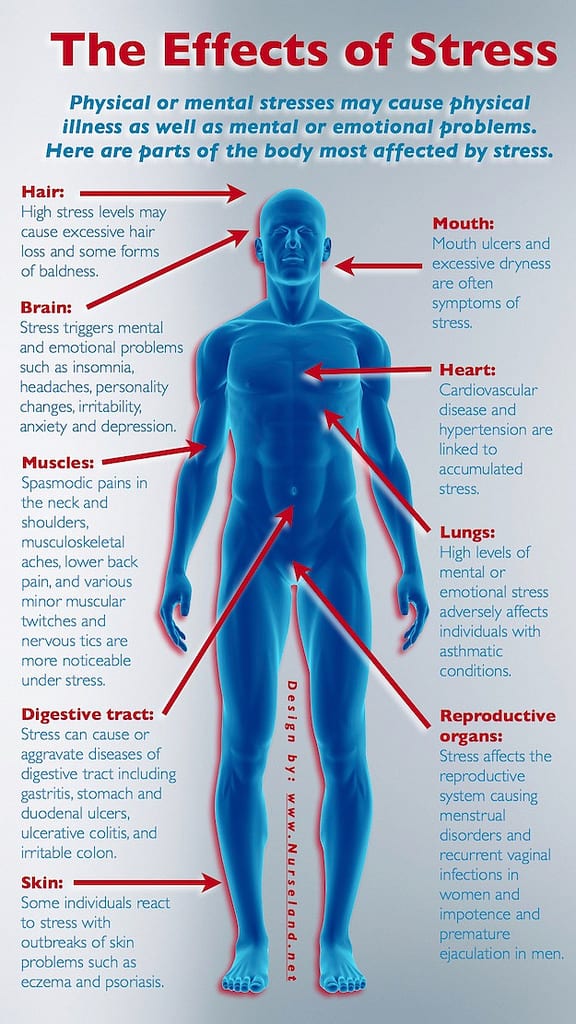
We've all experienced it – the feeling of having your heart broken by someone you love or experiencing pure rage at someone cutting you off in rush hour traffic. But we've also all experienced the opposite – butterflies when your crush smiles at you or the serenity of crisp fall air with falling leaves. But have you ever wondered what is really happening inside your body when you feel these emotions? Changes in heart rate, perspiration and energy levels, and hormone rushes are all physiological responses directly connected to your emotions!
The Chemistry of Negativity
Have you noticed that when you're unhappy, you're easily irritated and always on edge? This reaction is strongly connected to a biochemical response triggered in your body.

When experiencing sadness, anger, anxiety, fear etc., the adrenal glands that sit atop your kidneys release cortisol, a stress hormone. It's an incredibly fast-acting reaction, designed to provide a quick burst of energy needed to respond in a fight-or-flight situation. Once the cortisol release is triggered, it becomes difficult for a person to focus on anything but the subject of their distress.
Cortisol release technically poisons your body each and every time you experience negativity in any form. Moreover, repeated exposure to cortisol can eventually affect general health causing cardiovascular issues, high cholesterol, and liver or kidney damage.
The Chemistry of Positivity
In stark contrast to negativity, feeling happy, at peace or in love triggers an entirely different set of biochemical responses. When your boss comes to work in a good mood, it's an incredible day, right? They're nicer, more open to ideas, and pleasant to talk to. That's because the brain is actually releasing serotonin! Serotonin is a neurotransmitter, or chemical signal, released in the brain that is directly related to you feeling elated. It's also the reason many people use drugs like LSD and cocaine, because they release serotonin to create (artificial) happiness.
Research has also shown that being happy has numerous health benefits, such as longevity, reduced inflammation, lowered disease rates, and fewer chronic health conditions. However, many people think that there's no real way to be happy ALL the time. I mean something is always stressing you out, right? Wrong. There is a way to be at least peaceful, if not happy all the time, regardless of what happens around you everyday. That way for me was meditation.
The Science Behind Meditation
Graduate school is a breeding ground for emotional distress, and between juggling school, research and relationships, I began yearning to alleviate stress in a more productive way last year. When my parents suggested (because, you know, sometimes they do know best), that I start meditating, I was desperate enough for a solution to eliminate my anxiety that I actually gave it a try.
I once had a therapist tell me, “When you experience any negative thought or emotion, you have three seconds to get rid of it before your body releases cortisol.†Meditating gave me the power to become aware of how my body responds to negativity, and helped me control my body's response to my mood BEFORE I went into fight-or-flight mode. There is also abundant research on meditation to show that regular meditators have decreased brain tissue associated with anxiety, greater memory retention, and even improved cardiovascular and immune health. In fact, meditation also naturally increases serotonin levels and decreases cortisol levels, making you even happier!
It almost sounded too good to be true before I actually experienced it. I won't say that I felt the effects after a week or even a month, but after 6 months of meditating regularly, one day I woke up and realized that day-to-day stress didn't really bother me. While becoming an avid meditator seems like a major feat to accomplish (because you're thinking, “I don't have time!â€), it's really just like exercise, except not in a sweaty gym. It's been almost 2 years now, and I still meditate everyday. Being able to take that time to simply focus on my breathing and become aware of my body has helped me respond rather than react to negative emotions.
Here's some beginner tips and tricks to get started with meditation, and you can also always contact me to learn more about my practices!
About the Author
 |
Sudeepti Kuppa is a Ph.D. candidate in the College of Pharmacy and studies how to develop miRNAs into early detection biomarkers for clinically challenging gynecological cancers such as ovarian or metastatic breast cancer. She also got her undergraduate degree at UGA, so she's a Double-Dawg and hasn't regretted staying in Athens for a moment! When she's not in the lab discovering cool new things about cancer, Sudeepti likes to meditate, go to the gym and make sure she gets a healthy dose of TV and spends time with her pet rabbit Fessy (who's basically a dog)! To hear more from Sudeepti you can connect with her on over on Twitter . More from Sudeepti Kuppa. |
About the Author
- athenssciencecafehttps://athensscienceobserver.com/author/athenssciencecafe/April 17, 2020
- athenssciencecafehttps://athensscienceobserver.com/author/athenssciencecafe/April 12, 2020
- athenssciencecafehttps://athensscienceobserver.com/author/athenssciencecafe/April 3, 2020
- athenssciencecafehttps://athensscienceobserver.com/author/athenssciencecafe/March 30, 2020







